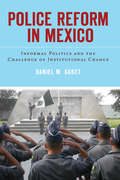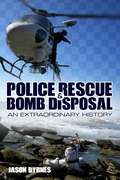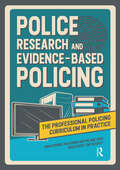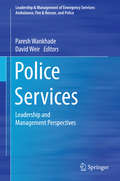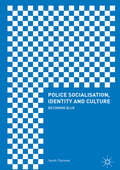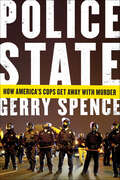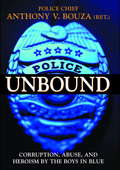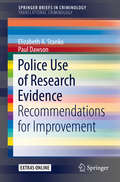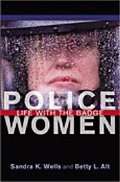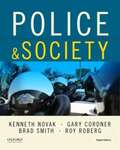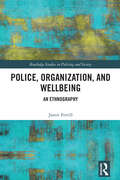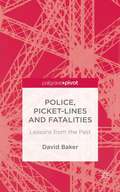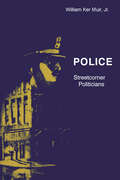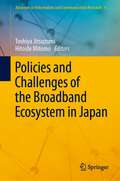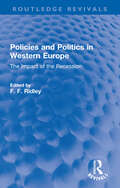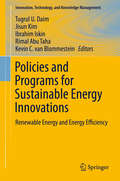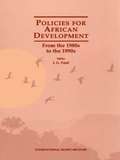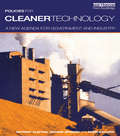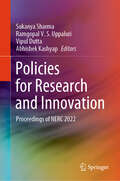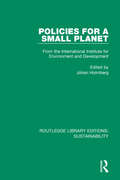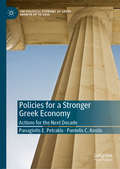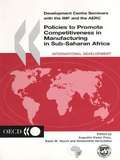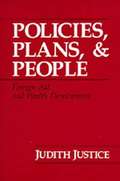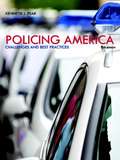- Table View
- List View
Police Reform in Mexico: Informal Politics and the Challenge of Institutional Change
by Sabet Daniel M.The urgent need to professionalize Mexican police has been recognized since the early 1990s, but despite even the most well-intentioned promises from elected officials and police chiefs, few gains have been made in improving police integrity. Why have reform efforts in Mexico been largely unsuccessful? This book seeks to answer the question by focusing on Mexico's municipal police, which make up the largest percentage of the country's police forces. Indeed, organized crime presents a major obstacle to institutional change, with criminal groups killing hundreds of local police in recent years. Nonetheless, Daniel Sabet argues that the problems of Mexican policing are really problems of governance. He finds that reform has suffered from a number of policy design and implementation challenges. More importantly, the informal rules of Mexican politics have prevented the continuity of reform efforts across administrations, allowed patronage appointments to persist, and undermined anti-corruption efforts. Although many advances have been made in Mexican policing, weak horizontal and vertical accountability mechanisms have failed to create sufficient incentives for institutional change. Citizens may represent the best hope for counterbalancing the toxic effects of organized crime and poor governance, but the ambivalent relationship between citizens and their police must be overcome to break the vicious cycle of corruption and ineffectiveness.
Police Rescue and Bomb Disposal: An Extraordinary History
by Jason Byrnes‘In police rescue, there is no such word as can’t. It CAN be done.’ Sergeant Ray Tyson, 1976. This is the story of an elite unit that has been protecting public safety for 75 years. Every day the women and men of the NSW Police Rescue and Bomb Disposal Unit confront some of the most challenging and harrowing situations imaginable; including recovering decomposing bodies from cliffs, cutting people out of the wreckage of crashed cars, or disarming improvised explosive devices. Nerves of steel, compassion and dedication to duty are the core requirements for police rescue operators and bomb technicians. Police Rescue and Bomb Disposal takes you on a journey from the dark days of World War II when police first formed a unit to recover bodies from Sydney’s cliffs, to the unit leading rescue operations at the Granville train disaster, the Newcastle earthquake, the Thredbo landslide, and other emergencies up to and including the Lindt Café siege. Drawing upon numerous interviews and official documents this book is complimented by many never seen before images and is a fitting testament to the dedication and personal sacrifices made by a small band of highly skilled professionals.
Police Research and Evidence-based Policing (The Professional Policing Curriculum in Practice)
by Craig Hughes Emma Spooner Phil Mike JonesEvidence-based policing is a core part of the National Policing Curriculum but policing students and new officers often feel daunted by the prospect of understanding research and how to use it to inform decision making in practice. This text helps readers develop a sound understanding of evidence-based practice in policing and contextualises the research process by explaining how it supports practice within the workplace. It clearly relates research to the investigative process, combining academic theory and operational understanding using relevant case studies and scenarios, and identifies the main approaches employed. It explores how evidence from research can be used to inform and develop critical arguments central to policing practice and signposts students to key sources of information.The Professional Policing Curriculum in Practice is a new series of books that match the requirements of the new pre-join policing qualifications. The texts reflect modern policing, are up-to-date and relevant, and grounded in practice. They reflect the challenges faced by new students, linking theory to real-life operational practice, while addressing critical thinking and other academic skills needed for degree-level study.
Police Services
by Paresh Wankhade David WeirThis volume provides fresh insights and management understanding of the changing role of policing against the backdrop of massive cuts in public expenditure experienced and the changing landscape of policing. The challenges of funding, training, online-crimes and cultural transformation are now felt globally. The need to learn and adapt from suitable models of police service delivery have never been greater. The book offers critical insights into the theory and practice of strategic and operational management of police services and the related professional and policy aspects. One of the highlight of this volume is to bring together scholarship using experts- academics, practitioners and professionals in the field, to each of the chosen topics. The chapters are based in the practical experiences of the authors and are written in a way that is accessible and suitable for a range of audiences. We are confident that this book will cater to a wider audience to inform policy and practice, both in the UK and internationally. Sir Peter Fahy QPM, Chief Constable, Greater Manchester Police Policing across the world is facing an increasing complexity of demand and public expectation creating new challenges for leadership and management. The contributors to this work are among the leading thinkers in policing and present important new insights into both the past and the way forward. It will be welcomed by all those convinced that radical new approaches are required across the public services. Bill Skelly, Deputy Chief Constable, Devon and Cornwall Police, UK At times it feels that the focus on leadership in the police service is all about what went wrong; the negative influences of a tightly-knit culture; and the almost inevitable rise of the technocrat. It is refreshing to read a book that seeks new insights into the positive influences of police leadership and offers the prospect of a more emotionally aware and spiritually rich approach as to how those insights may be practically employed for the benefit of all in the police family and the communities we serve.
Police Socialisation, Identity and Culture
by Sarah CharmanThis book reinvigorates the debate about the origins and development of police culture within our changing social, economic and political landscape. An in-depth analysis and appreciation of the police socialisation, identity and culture literature is combined with a comprehensive four-year longitudinal study of new recruits to a police force in England. The result offers new insights into the development of, and influences upon, new police recruits who refer to themselves as a "new breed" of police officer. Adding significantly to the police culture literature, this original and empirically based research also provides valuable insights into the challenges of modern policing in an age of austerity. Scholars of policing and criminal justice, as well as police officers themselves will find this compelling reading.
Police State: How America's Cops Get Away with Murder
by Gerry SpenceHow does America, founded on the promise of freedom for all, find itself poised to become a police state?In Police State, legendary "country lawyer" Gerry Spence reveals the unnerving truth of our criminal justice system. In his more than sixty years in the courtroom, Spence has never represented a person charged with a crime in which the police hadn't themselves violated the law. Whether by hiding, tampering with, or manufacturing evidence; by gratuitous violence and even murder, those who are charged with upholding the law too often break it. Spence points to the explosion of brutality leading up to the murder of Freddie Gray in Baltimore, insisting that this is the way it has always been: cops get away with murder. Nothing changes. Police State narrates the shocking account of the Madrid train bombings -how the FBI accused an innocent man of treasonous acts they knew he hadn't committed. It details the rampant racism within Chicago's police department, which landed teenager Dennis Williams on death row. It unveils the deliberately coercive efforts of two cops to extract a false murder confession from frightened and mentally fragile Albert Hancock, along with other appalling evidence from eight of Spence's most famous cases.We all want to feel safe. But how can we be safe when the very police we pay to protect us instead kill us, maim us, and falsify evidence against us. Can we accept the argument that cops may occasionally overstep their boundaries, but only when handling guilty criminals and never with us? Can we expect them to investigate and prosecute themselves when faced with allegations of misconduct? Can we believe that they are acting for our own good? Too many innocent are convicted; too many are wrongly executed. The cost has become too high for a free people to bear.In Police State, Spence issues a stinging indictment of the American justice system. Demonstrating that the way we select and train our police guarantees fatal abuses of justice, he also prescribes a challenging cure that stands to restore America's promise of liberty and justice for all.
Police Unbound
by Anthony V. BouzaFormer chief of police in Minneapolis and commander of the Bronx police force Tony Bouza pulls no punches in this blunt, candid assessment of police culture. Emphasizing the gap between the average citizen's perception of police work and the day-to-day reality of life as a cop, Bouza reveals the inner dynamics of a secretive, fraternal society that will do almost anything to protect itself. The strong bonds of loyalty among police both inspire individual acts of heroism in the face of danger but also repress full disclosure of the truth when corruption or abuse of power are suspected, says Bouza. Young rookies are quickly molded by the unspoken rules and the code of silence that govern a cop's professional life, and they soon learn that physical but not moral courage is expected.Bouza evaluates sweeps, roundups, sting operations, the controversial practice of racial profiling, and the politics of law enforcement. He critically examines the excesses, abuses, and corruption of the New York, Los Angeles, and Minneapolis police forces, among others, offering insights into what went wrong in the infamous Louima and Diallo cases.But his most telling criticism is not directed against the police per se but against our society's ruling elites and the middle class, who give police the unmistakable message that the underclass must be kept down and property owners protected at all costs. He charges that the heart of the problem of both crime and police abuse in America is our tacitly accepted class structure separating the privileged from the poor, and along with it the systemic racism that society as a whole is not yet willing to face. Bouza concludes his critique on a positive note with straightforward proposals on how to make the police more ethical and effective.This controversial, eye-opening book by a veteran insider exposes a reality that TV cop shows never portray and raises serious moral questions about class and race.From the Hardcover edition.
Police Use of Research Evidence
by Elizabeth A. Stanko Paul DawsonThis brief takes the reader through a 10-year journey of seeking to embed Evidence Based Policing within one of the largest police forces in the world - the Metropolitan Police Service in London, England - from the inside. As a topic, Evidence Based Policing has generated considerable recent interest and academic discussion - although largely remains without a consistent guiding voice for police practitioners. The aim of the brief is to expand upon the current discussions and address this gap within the day-to-day reality of policing where translation of research is a routine part of the day job. The book is organised into three sections: the first explores receptivity to evidence, asking practitioners to locate where they are on a continuum of evidence based craftwork; the second presents the importance of programme integrity and effective implementation in police craft; and the final section explores the challenges in professionalising policing and offers a more nuanced discussion around what it really means to be evidenced based. Throughout the brief the authors promote an insider whole-force strategic approach in landing evidence into policing 'business as normal' as opposed to an external academic or educated individual officer translation approach. Over the course of the monograph the authors draw upon their decade of experience providing case studies, toolkits, exercises, anecdotes and research experience as an inspiration for police practitioners both to practically support and inspire better evidence based working as part of the day job.
Police Women: Life With The Badge
by Sandra K. Wells Betty L. AltIt is often said that a woman must do a job twice as well as a man in order to get half the credit. This is particularly true of women in law enforcement. <p><p>Women have been involved in various forms of policing for the last 100 years, but it wasn't until the Equal Employment Act of 1970 that women could move from the job of meter maids to patrol and detective work. Yet less than 1% of all top-level cops are women, and there remain significant obstacles in the career paths of women in the force. This book looks at the history of women police officers and provides first-hand accounts of women at every level, including those who drop out. It addresses discrimination, competition, lack of mentoring, differential treatment and sexual harrassment, examining what issues play into the decision to stick it out or leave that many policewomen face. It also considers the family issues these women return home to at the end of the day. <p><p> It is often said that a woman must do a job twice as well as a man in order to get half the credit. This is particularly true of women in law enforcement. Women have been involved in various forms of policing for the last 100 years, but it wasn't until the Equal Employment Act of 1970 that women could move from the job of meter maids to patrol and detective work. Yet less than 1% of all top-level cops are women, and there remain significant obstacles in the career paths of women in the force. This book looks at the history of women police officers and provides first-hand accounts of women at every level, including those who drop out. It addresses discrimination, competition, lack of mentoring, differential treatment, and sexual harrassment. It looks at what plays into the decision to stick it out or leave that many policewomen face. It also considers the family issues these women return home to at the end of the day. <p><p> Unlike other treatments of the subject, Alt and Wells show how women have changed police work into a more community-oriented model of policing, reduced police violence, served as a strong force to promote a more effective response to domestic violence within police departments, and helped with community-police relations. With a combination of first-hand accounts, careful research, and lively analysis, the authors are able to convey the actual experiences of women who have made their careers behind the shield.
Police and Society
by Gary Cordner Roy Roberg Kenneth Novak Bradley SmithPolice & Society, Eighth Edition, offers an in-depth and analytical look at policing, from police behavior and organization to operations and historical perspectives. Focusing on the relationship between the police and the community and how it has changed throughout the years, the authors explore the most important theoretical foundations and incisive research on contemporary policing and show how that research is put into practice. The text is enhanced by extensive pedagogy and a unique chapter on higher education and policing.
Police, Organization, and Wellbeing: An Ethnography (Routledge Studies in Policing and Society)
by Jamie FerrillBased on the study of a police organization in England, this book explores the role of social relations in the ways that people construct, mobilize, consume, and reconstruct meaning about wellbeing. Wellbeing is a powerful, institutionalized concept in police organizations across England and Wales. With the emergence of numerous policies, strategies, and practices that both explicitly and implicitly address wellbeing in the workplace, the concept has come to feature prominently. Wellbeing is addressed as an issue that needs to be understood intersubjectively by attending to the underlying social issues that shape how it is promoted or denied. After a theoretical exploration of police culture and wellbeing, the book traverses ethnographic data and captures insights from individuals across the organization’s hierarchy. It explores what individuals perceive wellbeing to mean and how they make sense of the concept. The book reveals discernible ideological-laden tensions across the hierarchy in terms of wellbeing constructions. By exploring these tensions, there is a potential to understand the constructions of wellbeing and the resultant implications for practice. This book will be of interest to academics, researchers, and students in policing, criminology, criminal justice, leadership/management, organizational behaviour, and wellbeing. Given its empirical focus and applicability to practitioners, it will also be of interest to a range of non-academics, including police officers and leaders, public servants, private organizations, policymakers, and human resources professionals.
Police, Picket-Lines and Fatalities: Lessons from the Past
by David BakerBaker explores public protests and their management by the police, focusing on the fatalities of strikers at the hands of police and outlining practices towards preventing such tragedies.
Police: Streetcorner Politicians
by William K. Muir Jr."This book . . . examines the problem of police corruption . . . in such a way that the stereotype of the crude, greedy cop who is basically a grown-up delinquent, if not an out-and-out robber, yields to portraits of particular men, often of earnest good will and even more than ordinary compassion, contending with an enormously demanding and challenging job."—Robert Coles, New Yorker "Other social scientists have observed policemen on patrol, or have interviewed them systematically. Professor Muir has brought the two together, and, because of the philosophical depth he brings to his commentaries, he has lifted the sociology of the police on to a new level. He has both observed the men and talked with them at length about their personal lives, their conceptions of society and of the place of criminals within it. His ambition is to define the good policeman and to explain his development, but his achievement is to illuminate the philosophical and occupational maturation of patrol officers in 'Laconia' (a pseudonym) . . . . His discussions of [the policemen's] moral development are threaded through with analytically suggestive formulations that bespeak a wisdom very rarely encountered in reports of sociological research."—Michael Banton, Times Literary Supplement
Policies and Challenges of the Broadband Ecosystem in Japan (Advances in Information and Communication Research #4)
by Hitoshi Mitomo Toshiya JitsuzumiThis book shows how telecom, broadcast, and Internet researchers as well as experts from Japan's leading mobile operators interpret, analyze, and evaluate the emerging phenomenon of the Japanese broadband ecosystem. The broadband ecosystem, as it rapidly changes against the backdrop of swift technological progress, is forcing major changes in the existing socioeconomic framework and generating many policy issues that require discussion.The book aims to provide a theoretical and practical framework for policymakers to address these issues from a broader perspective than has been available in the past. The topics addressed in this book cover sharing of 5G infrastructure, online platform regulation, diffusion of autonomous driving, content industry, trends and use cases of 5G, capacity development for AI, ride-hailing service, smartphone games, the right to be forgotten, and the economic value of personal information.Although this book cannot provide definitive answers to all these recently emerging and rapidly changing issues, it does provide important guidance for evidence-based discussion involving policymakers and researchers working on these issues. It is also recommended for graduate students who want to enter this challenging field of policy discussion.
Policies and Politics in Western Europe: The Impact of the Recession (Routledge Revivals)
by F. F. RidleyThe problems of inflation, unemployment and economic stagnation are shared by all industrialised countries, but government response to them varies from state to state. This book, originally published in 1984, examines the effect of the recession of the 1980s on policy-making and policy content in Britain, France, Germany, Italy and Sweden. The author identifies the particular problems that face each country and explains why certain policies were adopted and how recession influenced policy-making. Through comparative analysis, the book shows how each government’s policy-making processes responded to the economic and social pressures created by a crisis in the world economy
Policies and Programs for Sustainable Energy Innovations
by Jisun Kim Tugrul U. Daim Ibrahim Iskin Rimal Abu Taha Kevin C. van BlommesteinThis volume features research and case studies across a variety of industries to showcase technological innovations and policy initiatives designed to promote renewable energy and sustainable economic development. The first section focuses on policies for the adoption of renewable energy technologies, the second section covers the evaluation of energy efficiency programs and the final section provides evaluations of energy technology innovations. Environmental concerns, energy availability and political pressure have prompted governments to look for alternative energy resources that can minimize the undesirable effects for current energy systems. For example, shifting away from the conventional fuel resources and increasing the percentage of electricity generated from renewable resources, such as solar and wind power, is an opportunity to guarantee lower CO2 emissions and to create better economic opportunities for citizens in the long run. Including discussions of such of timely topics and issues as global warming, bio-fuels and nuclear energy, the editors and contributors to this book provide a wealth of insights and recommendations for sustainable energy innovations.
Policies for Cleaner Technology: A New Agenda for Government and Industry
by Robin Williams Tony Clayton Graham SpinardiClean technology does not just aim to dilute or detoxify industrial waste. It aims to eliminate it by re-engineering the entire production cycle. As industry is constrained by regulations on the one hand and consumer pressure on the other, energy-efficient, resource-efficient and pollution-free production becomes imperative. It will be the next stage of industrial development. Using extensive empirical analysis of a range of different industrial sectors, this book shows how cleaner technology can be implemented, above all by the companies themselves. It looks at regulatory initiatives and focuses on how firms themselves can introduce the new technologies, systems and polices required.
Policies for Developing Forward Foreign Exchange Markets
by J. Quirk Graham Hacche Viktor Schoofs Lothar WenigerA report from the International Monetary Fund.
Policies for Research and Innovation: Proceedings of NERC 2022
by Sukanya Sharma Ramgopal V. S. Uppaluri Vipul Dutta Abhishek KashyapThe book aims to incorporate key findings pertaining to Northeastern India. The papers selected will highlight policies that are critical for fostering research and innovation in critical areas of scientific, social sciences, humanities and associated research paradigms relevant for the North-east.
Policies for a Small Planet: From the International Institute for Environment and Development (Routledge Library Editions: Sustainability #4)
by Johan HolmbergFirst published in 1992. The world is not living within its means. Current development policies, in both industrial and developing countries, are wasting resources and destroying the commons on which we all depend. The world is set on a path of deepening poverty and a deteriorating environment. New policies are needed to achieve sustainable development. This book presents an integrated series of essays on the policies for sustainable development from one of the leading policy research institutes on environment and development issues. It concentrates on the developing world and looks at the specific sectors to which the policies have to be applied. Beginning with a discussion of what constitutes sustainable development, it goes on to deal with the institutional arrangements needed to mobilise human resources for change and the economic policies for sustainable natural resource management. It then examines the policies needed in agriculture, urban development, industry, forests, drylands, energy use, finance, population and consumption. Throughout it demonstrates how those directly involved are best placed to manage their environments and resources. Policies must support the experience and resourcefulness of local people. Sustainable development requires that they control their own futures. This title will be of great interest to students of Environmental Studies.
Policies for a Stronger Greek Economy: Actions for the Next Decade (The Political Economy of Greek Growth up to 2030)
by Panagiotis E. Petrakis Pantelis C. KostisThis book presents a comprehensive economic plan for Greece to encourage growth and avoid future crises. This book emphasizes structural reforms and the rational financial management and analysis of private and investment infrastructures. This book also looks at the country's production and places an emphasis on revitalizing its technological structure. The analysis in this book includes policy implementation (in the short-, medium- and long-term) across important topics such as sustainability, inclusivity, pro-growth social behavior, and dynamic economic growth. This book takes an evolutionary economics perspective, looking at important structures throughout society like governance, political functioning, cultural attitudes, and growth. With its comprehensive approach, this book is crucial reading for scholars and policymakers interested in the Greek economy.
Policies to Promote Competitiveness in Manufacturing in Sub-Saharan Africa
by Saleh M. Nsouli Augustin Kwasi Fosu Aristomène VaroudakisPrimary commodities dominate African exports, yet these products are extremely vulnerable to variations in weather conditions, world demand and prices. If the continent is to obtain optimum benefit from the integration and opening of the world . . .
Policies, Plans, and People: Foreign Aid and Health Development
by Judith JusticeJudith Justice uses an interdisciplinary approach to show how anthropologists and planners can combine their expertise to make health care programs culturally compatible with the populations they serve.
Policing America: Challenges and Best Practices (Eighth Edition)
by Kenneth J. PeakPolicing America: Challenges and Best Practices, 8e, offers a problem-solving approach that emphasizes what is actually working in the field. Based on the author’s thirty-plus years of practical policing and academic experience, this eighth edition continues to be set apart by its traditional, applied, “what works” theme. That, coupled with comprehensive updates throughout and the minor restructuring of this edition, provide an approach not otherwise found on the market. Emphases are on topics of major, national importance and interest, such as terrorism, personnel issues, community policing, investigations, rule of law, accountability (ethics, liability), patrol, and technologies. Organized to flow smoothly for the instructor and student, this edition continues to provide a penetrating view of one of the most difficult and challenging occupations in America: policing!
